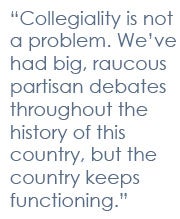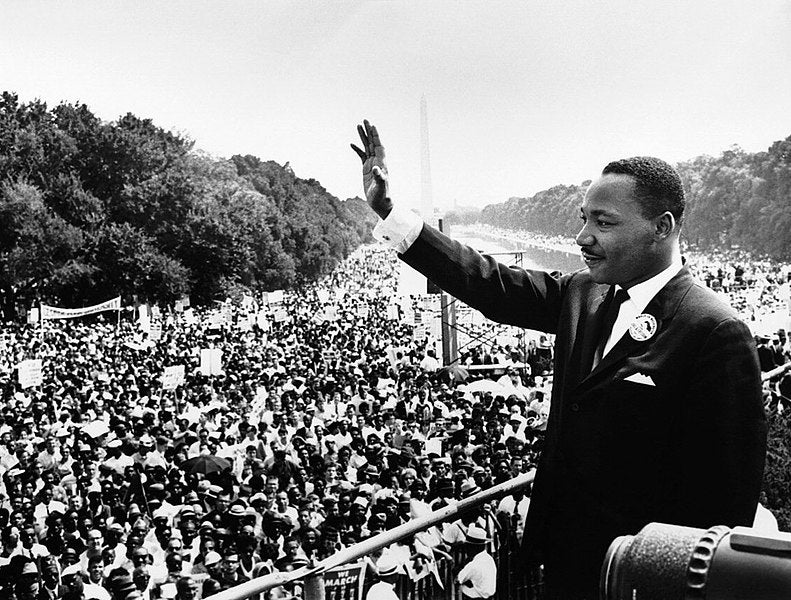Above, watch the full conversation with Senate Majority Leader Mitch McConnell and Aspen Institute President and CEO Walter Isaacson.
Senate Majority Leader Mitch McConnell recently declined to name his preferences in the large Republican field of presidential primary candidates, noting that, “I didn’t get elected unanimously as leader of the Senate by picking favorites.” He also made the analogy that the Republican field is like this year’s Kentucky Derby in that “there’s just a lot of good horses on the track.” But, speaking to a sold-out crowd as part of the Hurst Lecture Series in Aspen, CO, he did allow that his party needs to do better with minorities to win — and in particular, Latinos.

“My party does good with white people, but we need to do better with others, and the ones who are most open to us are Hispanic Americans, and they happen to be situated in swing states,” McConnell said. “So I’d like to see us nominate somebody who can appeal to that segment of electorate.”
McConnell refused to give his opinion of Donald Trump, but, referring to his earlier comments, he told the audience they should have a good idea of how he feels (Trump triggered plenty of backlash when he made inflammatory remarks about Mexican immigrants earlier this summer).
McConnell generally “toed the party line” when asked about issues such as the Affordable Care Act, the Iran nuclear deal, campaign finance, voter rights, and the new EPA emissions standards, but he also spent considerable time disabusing the notion that the US Senate is so deeply divided it can’t get anything done.
A ‘working’ US Senate
“We’ve clearly got a Senate that’s up and working again,” said McConnell. He explained that while he was minority leader, he and Vice President Joe Biden led three major bipartisan agreements. But he saw the dysfunction in the Senate when it couldn’t pass a budget in four of the last five years, and had only 15 roll-call votes in all of 2014. McConnell said he promised to end the dysfunction if Republicans reclaimed the majority — and he did, noting that so far in 2015 there have been 160 amendments to bills, mostly from Democrats.
“I felt it was my obligation to look for areas where there was the potential for agreement and try to advance the ball,” McConnell said, giving as examples trade promotion authority, the highway bill negotiated with Sen. Barbara Boxer (D-CA), the Keystone pipeline, and the Iran Nuclear Agreement Review Act, which will be acted on when Congress returns from its August recess.
The division between Democrats and Republicans in government is not as bad as it appears, McConnell assured, adding that he blamed the 24-hour news cycle of cable TV and the Internet for constantly promoting controversy, which is what sells. Despite what people think, coalitions of the middle still exist, he said; otherwise the aforementioned bipartisan deals would not have happened.
“Collegiality is not a problem,” he said. “We’ve had big, raucous partisan debates throughout the history of this country, but the country keeps functioning. We have a very passionate, involved bunch of American citizens, and those passions go through the roof when we’re electing a president.”
“There are two kinds of people in politics, those who want to make a point and those who want to make a difference,” he added. “In terms of the Republican conference, there’s 54 of us, and all but a handful go to work every day to try to find constructive solutions to America’s problems. And I think that’s also true on the Democratic side.”
McConnell also insisted there would be no government shutdown over budget negotiations this fall. When Aspen Institute President and CEO Walter Isaacson asked how he was going to prevent it, McConnell replied, “We’re just not going to do it. My party unfortunately owns the brand of government shutdown, and it’s a bad brand… When you take actions like that that the public widely views as irresponsible and disruptive, it’s not a winner politically.”
‘Big negotiations’ lie ahead
McConnell allowed that “big negotiations” lie ahead on spending, especially when “my party wants to spend more on defense and the Democrats want to spend more on everything.” Entitlement reform will certainly be one of the things considered, he said, suggesting that adjusting the eligibility of entitlement programs — such as raising the Social Security age to reflect future demographics — is something that needs to be done. Another is adjusting the consumer price index rate that many entitlement programs are fixed to, to more accurately reflect inflation.
McConnell also suggested that any compromises have to have the support of the president in order to gain traction.
“With all due respect to my Democratic colleagues in the Senate, there’s only one Democrat who counts, and that’s the guy with the pen,” he said. “If he’s inclined to support something, the Democrats would go along.”
On other issues, McConnell fully supports the concept of requiring photo IDs to vote, a partisan issue whose critics say restricts voting rights among minorities. “The notion that ballot integrity has something to do with voter suppression is ridiculous,” McConnell said.
He supports the Supreme Court’s Citizens United decision eliminating barriers to corporate political spending, saying that it “leveled the playing field” and that “it makes America a better, healthier place.”
He objects to the EPA’s proposed strict standards on carbon emissions on the basis of economics, arguing that he’s “not going to advocate policies that dramatically disadvantage ordinary people in America.”
McConnell also stated that Obama’s negotiated nuclear agreement with Iran “is not a very good deal” and that the Affordable Care Act is “the worst piece of legislation passed in the last half century.”
Yet, when asked about Obama personally, he said, “I like him. He’s a very smart guy, a very capable guy, but he’s very, very left. I think he’s the most liberal president since Woodrow Wilson… and unlike Clinton, who was more transactional, more of a deal maker, it’s much harder to meet him in the middle.”

